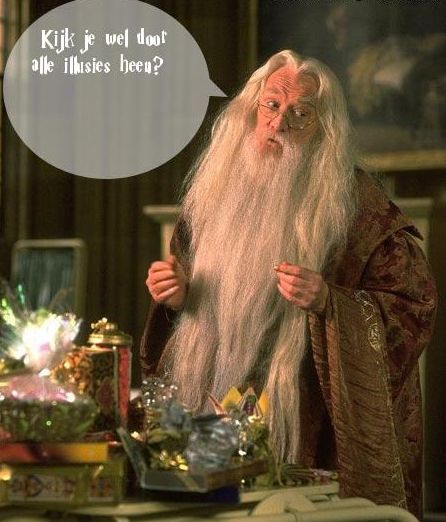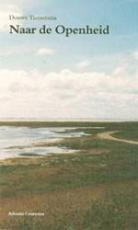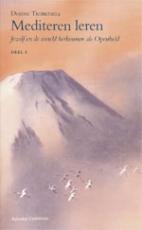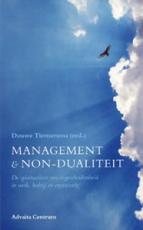Advaita Post 11-11 - In everyday experience the recognition of the openness ...
Volume 11 No.11 (June 30, 2010)
-- In everyday experience the recognition of the openness starts from your conditions; in insight there is the recognition that you are free of conditions --

Do you clearly see through all illusions?
The previous Advaita Post (#11-10) began with comments from Douwe about the political situation at the time in the Netherlands. Since this current Post refers to those comments they are included here (in blue):
The political circus here is now in full swing in the media. I’ve already been asked several times to say something about the upcoming election, because it determines the new government of our country.
It should immediately be clear that politics belong to the territory of the 'I'-person. It is related to that situation, which is to say, it is relative. From a wider perspective it can, for example, be determined that a population receives the government that it deserves. Things go the way they go, including the decisions people take with them into the voting booths.
Everyone wants to live together as pleasantly as possible. The situation and the conditioning of people make it a subject for differing opinions. The most basic conditioning is that of the 'I'-centric structure of existence. As a result, contradictions and conflicts are inevitable. Politics is the instrument through which such conflicts are made tolerable.
What can be said in relative terms about the notion of non-duality? It's clear to anyone who has a sense of it. But OK, I'll formulate it again.
In relative terms, anything that promotes non-duality can be considered positive and anything promoting duality can be seen as negative, because duality promotes suffering. This means that any movement which promotes unity is more useful than one which reinforces divisions. So when political parties are less egocentric, anthropocentric and power-oriented, when they have a broader viewpoint and arena of action which relates to (also future) generations and different ethnic groups, when they give attention to all living beings, they are more useful to the good life and living together than other parties. Traditionally these qualities have been identified as consciousness and love.
When that is somewhat clear, there is a doing without doing and then everything, including the election, will flow on in the best manner possible.
Love and politics
There were several questions about the content of the previous Advaita Post. The most important addressed the realm of what we call the absolute or absolute openness, relative to social and political affairs. Of course there are no rules of conduct to draw out from the absolute, since the absolute is independent of any substantive definition. Nothing can be said about it, though we have knowledge of it as the source of everything, including ourselves. It cannot be used as an element in an ethical argument for certain moral rules. What people find beautiful and what they find ugly, what is called good and what is called bad, appears upon the foundation of the absolute openness. In nature there are pleasant and unpleasant things, but this valuation comes from a certain point of view, not from absolute openness.
The last Advaita Post article about love began with the saying: "As long as the being of the cosmos exists, everything is love". With the creation from out of the absolute first comes space, light-space. From the light-space you can become internally aware of yourself. If you are consciously present there, you can recognize the qualities of being/I am, consciousness/light-being, and bliss-being/love-being. The universal sphere becomes your own sphere, as the limitations of your self-being (ego) disappear. Hence, the suffering that is associated with egocentricity disappears. Then it is clear that "as long as the cosmos exists, everything is love".
Love-being knows no boundaries and is therefore a universal non-duality, thus there is an original, self-evident goodness and wholeness which precedes oppositions. Hence the non-dual goodness precedes pity and compassion which presuppose a certain duality.
Love-being acts spontaneously in creation, also on the level of self-being which experiences itself as limited and hence suffers. Because love is universal, its expression in life and society happens by itself. Therefore, it's not about moral rules or a moral emotion. The infinite goodness is original and already exists in the first appearance of the creation-space. So it is the basis of all current life situations. Doesn't every living creature possess an existence-space that precedes every differentiation and interpretation?
If you want a better society and if you have a sense of the original non-duality, it's clear that a stronger sense of that in society is the most important basis for improvement. That ‘improvement’ means to become more ‘one’ in an aware manner, the falling away of divisions and of egocentricity. In relation to this direction of development, the nature of every behavior, as criteria, becomes clear, including political behaviour. Everything is placed into the light and through this the nature of the action becomes revealed. Hence, from the space of wholeness and even more so from the absolute, any closing off of an 'I' or of a group, and every absolutization of an 'I' or of ideas, is broken open. That was the role, among others, of the Old Testament prophets. That is the love which displays a harsh aspect for those who close themselves off. Thus real spirituality has strong political relevance through experiencing the space that exists before and beyond all politics. It is original goodness and love, as long as there is something. Sooner or later, this space breaks open any closed area and that could be perceived as hard. Yet it is nothing other than 'healing'. In this context, practical behaviour happens by itself in the great whole.
You spoke about 'your concentration' on the specific energy of something, such as a horse. Can that only come from an ‘I’, or can it come from freedom?
When it is open with you, there is no ‘I’ that is concentrated on something. When, from a limited identification with the body/mind you sense that something of the openness manifests, it's valuable in the context of your ability to go through that opening, into the real openness. If you accept that invitation, you forget your own self.
With Tai-chi you feel precisely how the other moves, you feel the energy of the other and through that you can seek out his weak spot. Then there certainly is the openness in the together-moving, but I notice that through it I also come back again into my ‘I’.
That's not the highest Tai-chi. You can at least imagine that it could be possible for you to no longer be positioned in the body which you call ‘my body’, that you are the being-awareness in which everything takes place in a straight forward manner. Then a transition happens from the 'I'-position where you scan the other, to a release of yourself in the great whole of non-duality. There is totally no distance between yourself and the other.
Someone comes along who wants to give you a shove. Then how can I avoid staying positioned inside the body?
You will have experienced sometime that you are not specifically situated in the body. Of course, you are the body and you experience it also from within. Simultaneously you experience it from without, in space. When both perspectives coincide, everything really goes by itself.
That's usually the case when you are walking on a narrow plank over a ditch. You experience your body from within and you also have an awareness from without. You monitor the situation from without in order to stay vertical over the hole and to continue taking firm steps. By becoming aware from a distance of that which at first was your own home, as body, you can let it relax. Also, with even more difficult activities, everything happens by itself. Then there is a great whole in which everything happens spontaneously, without you in it, without tensions, in a very direct way. And that's the best way.
I was wondering, when you spoke about naiveté, if naiveté can coincide with alertness? For example, you are enjoying nature, and suddenly you have to navigate a very slippery path. Then you must pay attention to avoid slipping.
Sure, but do you have to dive back then into the person who is afraid of slipping? That's it. In that continuously spacious being-awareness you can also see that there is a process in which alertness proceeds all by itself.
Perhaps with this kind of naiveté you can slip more easily, because you don’t find it so important?
That depends on your consciousness. When you are stabilized in yourself as being-awareness then there is the greatest possible clarity and that is best for the progression of events. When you stay positioned only in the body - I have already spoken about that - then you have a blind spot and can fall very easily.
When it's truly lucid, then you see when someone is trying to trick you. Then you think: "Oh let him do his mischief. It’s just a children’s game." If children would try it, you’d laugh as well. So you see the adult world that is full of such games and you laugh at it. Just look at politics: when you see the hypocritical fuss, you have to laugh. But sometimes you wonder if people will ever grow up.
The point is: with yourself, don’t let it go on indefinitely.
In essence, you indicate that naiveté is more important than alertness?
No, keep it as an aware naiveté, a naiveté with a very clear internal consciousness. Thus a being-awareness of yourself with the entire depth of self-being, one that's not stuck in an ‘I’ that wants to defend itself.
There was a story of a samurai or such who so alert that no one could tackle him. He was always so aware of his surroundings that he was even aware of any possible attack in his sleep. That might be great for a combat sport, but it's not appropriate for liberation because there's still a kind of bodily consciousness with a focus.
You’ve got it. Indeed, almost 100% of all martial arts are about people with a slightly enlarged consciousness from a center aimed at not being taken themselves.
Excellent, but consider for yourself what the consequences are: focus on the clarity that the expansion of your original being-awareness promotes. That clarity is not closed and is therefore open to the world, as long as there is one.
Yes, that's clear to me. From a certain openness, I made tremendous progress in Tai chi and suddenly it became important through receiving a compliment. I noticed that in the following days I felt completely stuck.
So in the expansion of awareness you see it and, once again, it's clear what's going on. So, when there is an opening presenting itself somewhere, a transition to an open field of being-experience, go completely into it. Then 'I'-elements disappear.
There is the story of Ashtavakra. Due to a curse from his father he was born with eight physical disabilities, because while Ashtavakra was still in the womb, he corrected his father’s Sanskrit. Ashtavakra was not troubled by his deformities and became a great sage. Later, when the curse was lifted, he became a handsome youth.
Again, that's also recognition. It happened to many who visited Nisargadatta. You saw that he had an advanced state of throat cancer, but that did not determine his suffering. That also applied to the location of the house with its noise, odors and awful disorder. Then you can confirm that the Truth has nothing to do with that. And there were women who took the incense sticks because they smelled so spiritual. "Ah, I light incense just to dispel the smell of the public toilets outside," Nisargadatta then said.
No, don't be so careful about circumstances. Be happy if you experience an opening somewhere in which the 'I'-tensions disappear. In the internal expansion of consciousness your openness stabilizes and becomes free of conditions. And that will happen. True openness is not dependent on conditions. Starting from a personal situation at first you have to deal with conditions, those that are more convenient and useful than others. But, when you experience something of an opening, stay focused on the essence of the opening. Go precisely towards what the essence of that opening is. You experience a bit of openness when you go out into the spring. What is the essence of that? That is life which always proceeds in its development, that is universal living energy. Then you see that your situation is the universal life energy and that it's not dependent on the condition of going out into the spring, or of the nice weather. When you stay with the essence, it remains stable, even though circumstances can change.
Is that clear? That's really very important. A first recognition occurs somewhere in the phenomena. Take a look at what the essence of that is and remain with that essence so that it can clearly manifest. This also means that you recognize it as your own essence. When you are stabilized in your own self-sphere, you are not dependent on conditions.
In everyday experience the recognition of the openness starts from conditions; in insight there is the recognition that you are free of conditions
A summer greeting to everyone,
Douwe Tiemersma
Er is geen tweeheid
als je ontspannen bent
in zelf-bewustzijn
is dat duidelijk.
Boeken
Douwe schreef en redigeerde gedurende zijn leven boeken. Via onze uitgeverij zijn deze nog verkrijgbaar.



